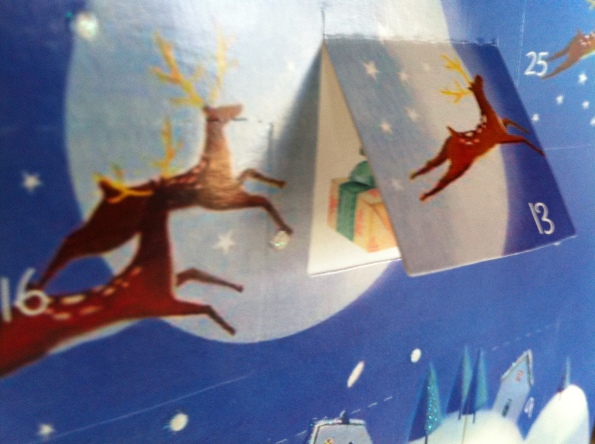
I found an Advent calendar last Saturday. For a brief moment, I breathed the crisp air of a New Jersey morning from my youth. Snowdrifts lined our street. Footprints pounded snow into an icy maze along the sidewalks. Fall vanished beneath the wintry world, and a hidden magic unveiled before my eyes.
The Advent Calendar of my childhood counted down the days to Santa’s appearing. Each window revealed some small token, some promise that Santa would soon be here. Each day, I caught just a glimpse, a flash, a promise that he was coming. And coming soon.
While this may sound strange, I think the Advent calendar functioned in an apocalyptic role. The little windows opened into a promised world, another realm. They revealed something deeper, more wondrous than I could grasp with my eyes or ears.
Apocalypse unveils. Exposes. Reveals. Some times this is good and some times it is bad. Isaiah reveals that Israel is not clothed fine linen but unspeakably dirty rags. Think of Scrooge. The ghosts of Christmas play an apocalyptic role in his life. They open his eye to a world that he has failed to see. They unveil the joys, the suffering, the love, and even the death.
For once, Scrooge sees himself as he truly is: a dead man. The terror drives him to repent.
Advent is a time of apocalypse. As the dark days of December give way to winter’s night, we focus on the light of the coming Son. We are watching and waiting. Like the little windows on an Advent calendar, we are unfolding new surprises of God’s coming each day.
We pray for eyes to see and ears to hear. Like the child searching for magic beneath every Advent window, we are looking for glimpses of glory. Just as Solomon exhorts us to search for wisdom as silver and as hidden treasure, we search for the Son. We look for His unveiling.
The unveiling may be gentle. We might behold our neighbors through the light of His glorious love and realize just a glimpse of the wonder they truly are. We might pause over the simple act of sipping tea and offer thanks for the gracious gifts of our good Lord. We might realize His glorious touch in the people and places all around us. Our hearts might be like a little child as we sense the glory of the Lord drawing near.
But a word of caution: Advent can also be dangerous.
Gentle Jesus also comes with sword. The Prince of Peace may appear in terrifying splendor and a fury of unspeakable glory. When John beholds the wonder, he falls down as though dead.
4 His head and hair were white like wool, as white as snow, and His eyes like a flame of fire; 15 His feet were like fine brass, as if refined in a furnace, and His voice as the sound of many waters; 16 He had in His right hand seven stars, out of His mouth went a sharp two-edged sword, and His countenance was like the sun shining in its strength.[1]
In the middle of the day, in the middle of the hour, in the middle of the moment, the Son appears. When He comes, the sword of His word penetrates our blind eyes and dead ears with the roar of glory.
Opening our blind eyes can be a bit of a jolt. Annie Dillard writes, “If we are blinded by darkness, we are also blinded by light. When too much light falls on everything, a special terror results.”[2] So be warned.
He may come as a gentle breeze awakening us from a soft sleep. But he may come as a trumpet blast awakening us from a death like oblivion. The Son may pierce with His Word and wound with His love. In beholding Him, we also behold our own broken hearts, our own dirty rags. The light of the Son can burn and heal at the same time.
The days of unveiling have come. Let us pause. Look around. Watch. Wait.
[1] The New King James Version. 1982 (Re 1:14–16). Nashville: Thomas Nelson.
[2] Dillard, Annie (2009-10-13). Pilgrim at Tinker Creek (Kindle Locations 341-342). Harper Perennial Modern Classics. Kindle Edition.
December 3, 2012 at 1:22 pm
Doug,
As usual you draw dimensions from familiar forms into our sight that broadens our vision. I especially like the dual aspects of Christ’s apocalyptic character, darkness and light. May it be so that we look for his coming in all things, in all persons, and all times. Thanks for devoting yourself to this meditation.